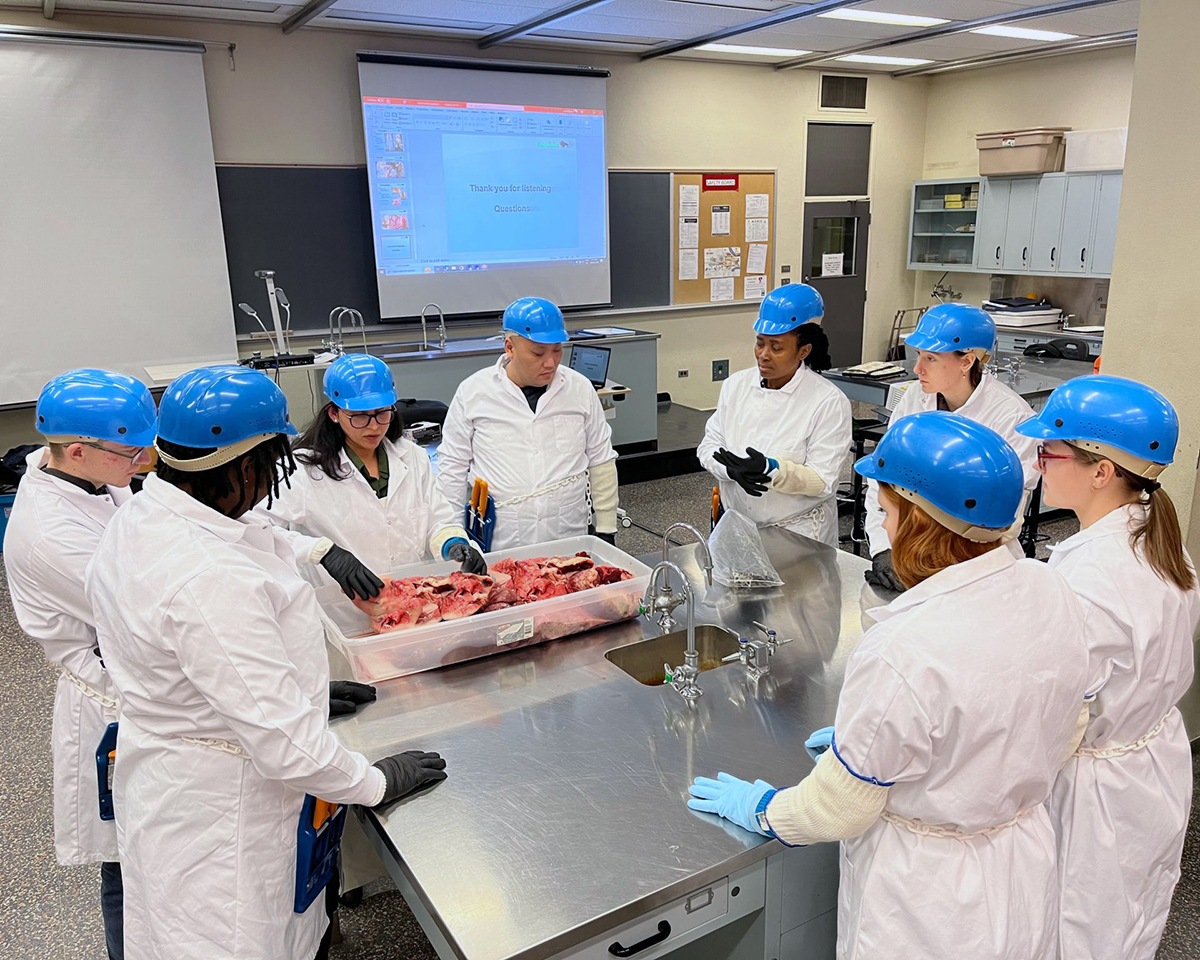
Cattle Country: University of Manitoba offers meat inspection training to students
The following article was written by Peter Frohlich, National Centre for Livestock and the Environment (NCLE), University of Manitoba. It was originally published in Cattle Country in August 2024.
Manitoba has 25 provincially and five federally inspected meat abattoirs. Meat inspectors usually require a bachelor’s degree or college diploma in agriculture, animal science, biology, chemistry, food science or a related discipline. Following graduation, meat inspector candidates must undergo a 2–3-year on-site training process to become an independent inspector.
To help students gain additional background in this area and address the growing need for meat inspectors in Manitoba, especially in rural areas, the Faculty of Agricultural and Food Sciences has developed a new course: Meat Inspection: Understanding and Enhancing Animal Harvesting Practices. According to Dr. Navjot Virdi, Food Safety Veterinarian and Manager – Meat Inspection with Manitoba Agriculture (MB AGR), this course will increase the pool of candidates for vacant meat inspection positions in these abattoirs in the future.
What is Meat Inspection?
Meat inspection is a regulatory requirement to harvest an animal in a provincially or federally regulated abattoir if the intent is to sell the meat for human consumption. Therefore, all provincial and federal regulated abattoirs in Manitoba must have a trained meat inspector on-site during the harvest operation.
Meat inspectors make professional judgment when food animals arrive at provincial and federal abattoirs to determine if the animal is healthy and suitable to be harvested. Assessing the health of animals prior to harvest is important because there are some diseases that can be transmitted to humans through contact with the infected animals (e.g., bovine tuberculosis) or by ingestion of infected meat or meat products (e.g., trichinosis, salmonellosis).
After the harvesting process, the inspector carries out a post-mortem inspection to ensure the meat is safe for human consumption. The inspector decides if the meat is approved, is held for additional inspection, is directed to animal feed, or is condemned (e.g., must be incinerated or sent to landfill).
Additional roles of a meat inspector include ensuring that the animals are treated humanely, and abattoirs are maintained and run in a sanitary manner. Inspectors possess the scientific-based knowledge to identify and prevent food safety risks and ensure the abattoirs operate as per provincial food safety and animal welfare regulations.
What will students learn in this course?
As part of the course, students will receive in-class and hands-on training. A team of instructors, including Dr. Argenis Rodas-Gonzalez, Associate Professor with the Department of Animal Science, Dr. Navjot Virdi (MB AGR) and Dr. Claudia Narvaez-Bravo, Professor at the Department of Food and Human Nutritional Sciences, will lead the classes.
Students who register in the course will have the opportunity to learn about a range of topics specific to beef, pig, lamb and poultry processing. In addition, topics including animal behavior and handling, pre- and post-mortem inspection, the harvest process, facility design, storage and preservation of meat, food safety regulations and more, will also be covered.
Career opportunities in meat inspection
There are several career opportunities in meat inspection. These include work as an inspector in provincially or federally regulated abattoirs or meat processing plants or serving in a quality assurance role.
What’s on the horizon for meat inspection?
Argenis Rodas-Gonzalez is taking meat inspection one step further. He has support from both provincial (MB AGR) and federal government groups (Canadian Food Inspection Agency, CFIA) and is seeking additional partners to explore and test the use of smart glasses and augmented reality technology to conduct meat inspection remotely as further solutions to the meat inspector shortages in the province. Augmented reality is an interactive experience that combines the real world and computer-generated 3D content.
According to Rodas-Gonzalez, the technology will enable an offsite inspector to partner with an onsite trained technician to inspect the carcass and by-products for defects remotely and in real time. The technician in the processing plant will wear special glasses with hands-free commands to enable two-way live video communication with an offsite inspector. The team will then test if the augmented reality software is as effective as an on-site inspector. According to Rodas-Gonzalez the information generated from the project will result in the development of a procedure for remote inspection and will aim to prove the effectiveness of this technology.
There are several additional benefits of the project that include opening the door to access new, better, and more diverse marketing opportunities for smaller processors (e.g., buy-local programs, more product availability, selling directly to retailers) and increased beef production processing capacity (e.g., more work shifts per week).
Meat inspection agencies could also make more efficient use of the inspector’s time, reduce downtime and address the meat inspector shortage. The project will also increase the competitiveness (e.g., increase market share by volume) and sustainability (e.g., increased meat supply) of the Canadian meat industry in the domestic market.
For more information on the course and novel meat inspection AI technology, contact Argenis Rodas Gonzalez at Argenis.RodasGonzalez@umanitoba.ca.






